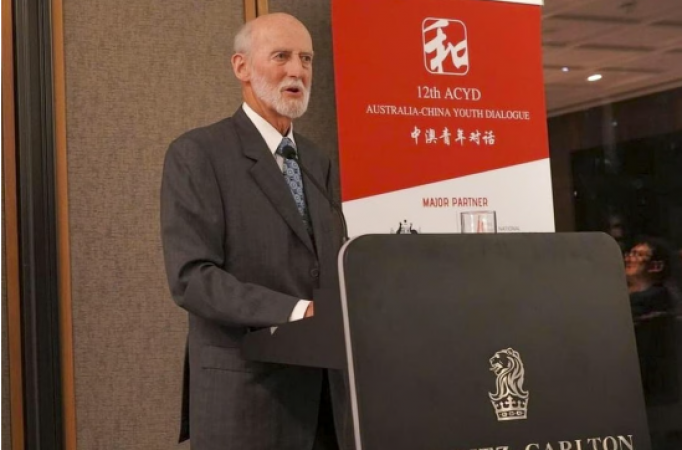
Canberra: In a time of a "rebalancing of the equation," a former Australian diplomat thinks "objectivity" is the most crucial quality in maintaining mutual understanding and trust as China and Australia enter their 50th year of diplomatic and trade ties, both of which have been strained recently.
David Ambrose, a career diplomat who accepted his first diplomatic assignment in Beijing in 1975, considers China and Australia to be "natural partners" with complementary economies and no inherent conflicts of interest. He also thinks that both countries should work to "build on" their relationship rather than simply "restore" relations.
Ambrose cited a prediction made by the Australian government that by 2035, China's share of the world's gross domestic product (GDP) as a percentage of total output will be 25%, compared to the United States' 14%.
Being objective, according to Ambrose, "means at least sufficiently distancing yourself from both your own interests and your own biases to actually look at the other side and try to understand its positions," she said in an interview with the Post that took place last month at the end of the 12th Australia-China Youth Dialogue in Perth.
Since China is communist and Americans have a deep-seated dislike and mistrust of communism, in my opinion, they cannot be objective about China.
Since 2020, there has been tension between Beijing and Canberra. As a result, China has used a number of trade and administrative tools to also ban Australian goods. However, tensions appear to be easing as evidenced by a meeting between President Xi Jinping and Australian Prime Minister Anthony Albanese last month.
Ideology, according to Ambrose, is an underappreciated factor that can harm a relationship's progress. He added that ideology "in a sense distorts the way you look at your so-called opponents" because holding to particular beliefs will affect policy and make one lack objectivity.
Ambrose, who has also worked in Hong Kong, Belgrade, Vanuatu, and Shanghai, thinks that trust is essential for maintaining harmonious bilateral relations, but that there has recently been "a breach of faith" in the relationship that needs to be repaired.
He declared, "The Chinese won't drive the Americans out of the Western Pacific."
But there has been a change in who holds the majority of wealth and power, forcing Australia to make decisions.
Also Read: The Connectivity division of Meta is shut down after almost ten years
According to senior officials from both nations, the US announced last week that it will increase its military presence alongside Australia to counter China's "dangerous and coercive actions" in the Indo-Pacific region.
Ambrose pointed out that iron ore and liquefied natural gas, which make up the majority of Australia's exports, are "a huge part of national incomes" to China.
According to official data released by the Government of Western Australia's Department of Jobs, Tourism, Science and Innovation up until October, the mining sector will contribute close to 50% of the state's GDP in 2020 and 2021.
The largest state in Australia, Western Australia, contributed 17.5% of the total national GDP.
But according to Ambrose, the US has probably done more than any other nation in recent decades through foreign investment, technology transfer, and academic exchanges to assist China in successfully modernising.
Ambrose, the former boss of former Australian prime minister Kevin Rudd and current Australian ambassador to China Graham Fletcher, said, "It's a problem now that the US has codified its ideology and characterised the whole relationship with China as a clash between ideologies - democracy and the rule of law against autocracy."
There is an arrogant assumption that China will gradually change to resemble the United States.
Ambrose was hired by the Office of National Assessments, which was established by the then-prime minister Malcolm Fraser in 1977 to provide intelligence on political, strategic, and economic issues, as the national assessments officer in charge of communist Asia, including North Korea, China, Vietnam, Cambodia, and Laos.
When Gough Whitlam became prime minister of Australia in 1972, diplomatic relations between China and Australia had just been established five years earlier.
According to Ambrose, the two nations experienced "sunshine years" between the 1980s and 2000s as China's steel industry boomed as a result of its rapid economic growth.
Also Read: India's toy market is ready to compete with China as New Delhi prepares new subsidies
Zhao Ziyang, then the premier of China, and Bob Hawke, then the prime minister of Australia, agreed to invest Chinese capital in the Mount Channar joint venture iron ore mine in the Pilbara region of Western Australia in 1984, with Ambrose serving as the department's head of the China section at the time.